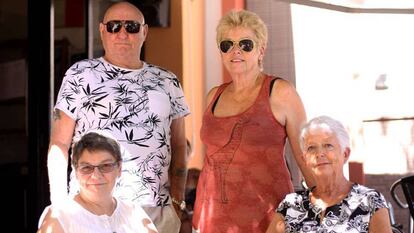“I hope the Spanish government lets me stay until I die”
Post-Brexit, British residents in Spain are uncertain whether to go home or apply for citizenship


It’s 10am and, although Llíber has the third-largest non-Spanish population in Spain, few of them are out and about yet. Almost all of them live in free-standing houses with gardens, scattered around this attractive town of around 1,000 inhabitants, nestling in wooded hills some 15 kilometers inland from Calpe, in Valencia’s Alicante province. Most are pensioners, and on the morning of June 24, the day after the British electorate narrowly voted to leave the European Union, their futures in Spain suddenly became uncertain. For a start, their savings and pensions had dropped in value overnight due to the devaluation of the pound, while their right to vote in local elections was no longer assured.
Around 300,000 Brits live in Spain, according to official data, a third of them in Valencia. And most of them are now extremely apprehensive about what the future holds.
“Most of them say they’ll leave here in a coffin,” says Dora, who works in the local chemist and helps those with limited Spanish with their prescriptions. Seven hundred of the town’s 1,100 inhabitants are foreign, with the British community making up the majority. At the heart of the Marina Alta district, Llíber is particularly attractive to foreigners, says farmer Toni Morán, who also mans the telephone at the local health center. “It’s not too cold and it’s not too hot,” he says. “It’s also just 20 minutes from the beaches in Calpe, Benidorm, Moraira and Xàbia, and the land isn’t as expensive as down on the coast.”
Most Britons living in Spain say they’ll only leave here in a coffin
Since the Brexit vote, however, there are more and more signs going up to advertise properties for sale along the coast of Alicante. Of course, some were there before Brexit, and some of those selling are British pensioners aged between 75 and 80 who want to get back to Britain and their families because their partner has died and they don’t want to be alone in their old age.
But Suzanne McAllister, who for the last five years has been a member of the town council on behalf of the Popular Party and whose duties mainly involve sorting out paperwork for her fellow British retirees, is not keen to go home. “If necessary, I’ll apply for Spanish nationality,” she says, adding that most who would like to stay are leaning toward the double-nationality solution.
Brexit “lies”
A native of Leicester, McAllister is angry with those who supported Brexit. “In the campaign for the referendum, a lot of lies were told,” she says. “The immediate consequence has been the weakening of the pound and, in spite of everything, they keep telling us it’s temporary and that it will get stronger again in a few months. But we don’t have a crystal ball.”
Brits living in Spain will lose their right to vote in local elections when Brexit becomes a reality. “In Valencia, Murcia and Alicante, there are a lot of town councils with British people serving on them,” says McAllister. “Something has to be done.”
The process promises to be a long one. David Wicks, a 71-year-old English pensioner, says he is not about to make any drastic changes. He’s one of the few Brits to be drawing a Spanish pension and says he’s not overly concerned about his own situation. “Whatever happens,” he says, “Spain is home. I hope the Spanish government lets me stay until I die.”
Sign up for our newsletter
EL PAÍS English Edition has launched a weekly newsletter. Sign up today to receive a selection of our best stories in your inbox every Saturday morning. For full details about how to subscribe, click here
Wicks says that while Britain has become increasingly xenophobic in the last few years, many of the staff in the health service are foreign, to the extent that he believes it would collapse without them.
Lorrie Harkness, 67, says she will apply for Spanish nationality if she needs to, adding she would like the United Kingdom to leave the EU as soon as possible rather than waiting until the end of the two-year withdrawal period, which she says is simply extending the uncertainty. “We can’t just wait and wait,” says Harkness. who is dubious about the UK’s ability to maintain a reciprocal agreement over health and the pensions agreement as it stands.
According to Harkness, the UK could have tightened immigration controls years ago and didn’t. Now she thinks it’s too late. “People go to Britain because they get financial support they don’t get elsewhere,” she says. “Everyone wants to live there. Of course they do.”
English version by Heather Galloway.
Tu suscripción se está usando en otro dispositivo
¿Quieres añadir otro usuario a tu suscripción?
Si continúas leyendo en este dispositivo, no se podrá leer en el otro.
FlechaTu suscripción se está usando en otro dispositivo y solo puedes acceder a EL PAÍS desde un dispositivo a la vez.
Si quieres compartir tu cuenta, cambia tu suscripción a la modalidad Premium, así podrás añadir otro usuario. Cada uno accederá con su propia cuenta de email, lo que os permitirá personalizar vuestra experiencia en EL PAÍS.
¿Tienes una suscripción de empresa? Accede aquí para contratar más cuentas.
En el caso de no saber quién está usando tu cuenta, te recomendamos cambiar tu contraseña aquí.
Si decides continuar compartiendo tu cuenta, este mensaje se mostrará en tu dispositivo y en el de la otra persona que está usando tu cuenta de forma indefinida, afectando a tu experiencia de lectura. Puedes consultar aquí los términos y condiciones de la suscripción digital.








































